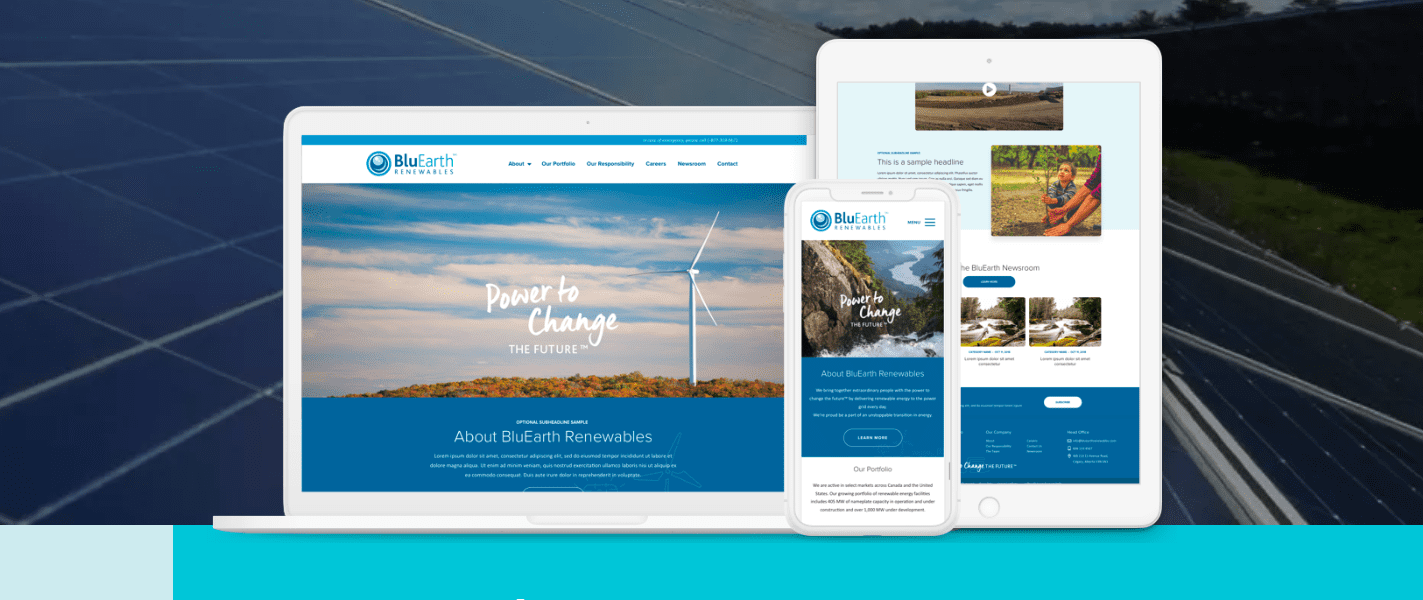In the ten years that I’ve been running Forge and Smith, one of my main responsibilities is handling sales. In that time I’ve fielded thousands of leads and inquiries, and the one question I get more than any other is “How much does a website cost?”.
We all like tidy answers, and easy ways to compare option A with option B. Complicated answers are extremely frustrating when we’re trying to make a decision – I get it, I really do. Unfortunately, websites (and the digital strategies connected to them) are getting more and more complex every year.
Post Contents
How much does a website cost? It depends.
Websites are not a product anymore, like they were in the days of brochure sites and HTML inline styles. With the diversification of search behaviour to include social media (did you know that YouTube is the second largest search engine on the web?), and the increasingly noisy landscape of content marketing, websites are no longer an easily answered question.
Businesses now have a plethora of CMS, DIY, and Hosted website options to choose from, which all come with their pros and cons. In order to answer the “how much does a website cost?” question, we first have to determine which solution best fits your needs.
The four types of business websites
There are four main types of websites, suitable to different goals, budgets, and in-house technical capabilities.
- Hosted Websites are website applications that you pay a monthly or annual fee to use, and come bundled with specific templates, content management, and optimizations. Some popular examples of hosted website solutions are SquareSpace, Wix and Shopify.
- DIY Websites are usually open-source CMS websites – the most popular being WordPress – which you install on your own hosting and use purchased “themes” from various marketplaces. These themes come packed with colour options, page and post templates, and other features that allow you to build your own website to your exact needs.
- Page Builder Websites are another form of DIY website, but with even more DIY-ness but much less technical know-how. Using popular plugins like Visual Composer, Elementor, or Divi, you can effectively build your site using preformatted content blocks.
- Custom Websites are sites effectively built from “scratch” with the assistance of a web design and development agency or freelancers. They can be built on open-source, licensed, or even fully custom CMS platforms.
How to choose the right website option
Like all things, there are pros and cons, advantages and disadvantages, to each of the above mentioned options. Your goals and available budget will play a large part in determining which is the right fit for you, as well as your technical know-how (or patience with learning new things).

Hosted Websites
If you’re asking “how much does a website cost?” and hoping for the lowest figure possible, this might be your solution. Hosted websites are cheap, quick to get up and running, and require very little technical knowledge. The templates available for the main platforms tend to have similar aesthetics, leaning heavily towards big images, simple typography, and lots of space. They also come with a lot of support including SEO help, template modification options, and even eCommerce solutions.
The downsides to hosted websites are mostly on the customization and performance side of things. Whereas hosted website companies all say you can customize the templates to your heart’s content, that’s not exactly true.
They all typically use their own templating language to try to remove the need for their users to understand HTML or CSS code. While this makes it easier to understand, you don’t have anywhere near the same control as you would working with actual code.
SEO performance will also likely be a challenge on hosted platforms for several reasons. Most of these platforms’ templates tend to lean towards large images and simple interfaces that are beautiful, but can often be devoid of actual content. Google doesn’t care about beauty or images, it cares about content. If there isn’t any, you don’t get to play.
This is not true of all templates, but it’s a common pitfall to be aware of.
Hosted Website Pros
- Low cost
- Quick to set up
- Low technical knowledge
- Lots of beautiful and professional templates to choose from
- No need to worry about updates or hacks
- Strong support
Hosted Website Cons
- Poor customization options
- Limited longterm SEO and search performance value
Average cost
- $15 – $300/month
Recommended for:
I often recommend this option for brand new businesses as a way to focus a small marketing budget on ad campaigns, copywriting, and social media help, rather than sinking it into a fancy custom website. Hosted websites are a solid place to start from nothing, and give you time to build the early phases of SEO equity and rankings
Not recommended for:
Mature businesses looking to take their digital strategy to the next level will find the SEO limitations of hosted website solutions frustrating. As well, mature businesses are usually ready to start investing time into telling their stories, which benefit from full creative freedom that a hosted solution simply can’t provide.
DIY Websites
If you’re technically inclined, a DIY website can give you the low cost and quick start of a hosted website but with greater control over customizations. Since DIY sites are usually on open source CMS platforms like WordPress, you also have an entire ecosystem of plugins and services at your disposal to enhance functionality.
But with great power comes great responsibility! Marketplace themes are great and come packed with tons of options, but not all themes are created equally. Some of them have appalling code implementations that can result in truly terrible page speeds and poor accessibility, which will hurt your SEO.
Themes are also only good as long as their technical support lasts. Since CMS platforms will never stop evolving, once a theme developer decides to discontinue support for a theme, it’s only a matter of time before your theme breaks. Think of it as a built-in expiration date for your website.
DIY Website Pros
- Low cost even if you need a developer to assist in setup
- Greater control over customization
- Availability of plugins and add-on services based on your CMS
DIY Website Cons
- Expiration date on the theme
- Bloated code and potential plugin conflicts
- Regular bug fighting
- Poor pagespeed performance
- Negative SEO impacts
Average cost
- On your own: $50-100 + Hosting (usually $10-$50/month)
- With a developer’s help: $500-$3000 + Hosting
- Additional bug support may be required throughout the year
Recommended for:
For new businesses that don’t find a fit with hosted website templates, this can be a solid low cost option to get started. It requires more elbow grease and know-how, but there are tons of resources to get up to speed. For more mature businesses in the 2-4 year old range that aren’t quite ready to invest a more custom approach, this can also be a great option for improving the overall brand experience and storytelling on your website.
Not recommended for:
If you don’t have technical abilities and aren’t keen to learn, this would be a poor solution. If you have a comprehensive vision for the look and feel of your site, you may find the compromises necessary for this approach to be too restrictive. Fully mature businesses with advanced digital strategy and SEO requirements are advised to stay away, because “built for everyone” themes will just not be able to perform at the required level.
Is your business website suffering from a major design flaw? Read What’s Wrong With My Website: 15 Web Design Mistakes!
Page Builder Websites
As mentioned, a page builder website is effectively a DIY site with a different make-up. Themes that support the most popular page builder plugins will often be more flexible (I’m showing my WordPress bias here), since the plugins to do the heavy lifting – and come with hundreds of page structure options and potential combinations. Visual Composer, Elementor, and Divi are more or less identical to the untrained eye.
The upside here is that you’ll likely get a more stable website, provided the marketplace theme specifically supports your page builder of choice. The page builder plugins themselves come packed with a vast array of content blocks with easy drag-and-drop interfaces. Code knowledge is slim to none, as the styling work is almost entirely GUI based.
However, to power all of this amazing interface control requires a ton of code. The resulting website will often have deeper than necessary HTML structure and bloated CSS. It’s important to note that at some point your digital strategy will become a game of inches, fought over technical SEO points. Bloated code, higher than optimal HTML-to-content ratios, and poor accessibility will become problems that need fixing.
Finally, there are a lot of content blocks in these plugins and it’s easy to assume everything you need is included. If you come to portion of your site where there is not an ideal templated block available, your options to create your own can be limited. Some page builder sites do include custom blocks in their core functionality, but like everything else, these are limited to a handful of content elements and a drag-and-drop experience.
Page Builder Website Pros
- Better stability than a typical DIY theme
- Significantly more control over page layout
- Less code knowledge required
Page Builder Website Cons
- Bloated code that could lead to poor pagespeeds and SEO authority
- Limited advanced customization options for custom blocks
- CSS can be highly localized, making even minor CSS adjustments problematic for less advanced users
Average cost:
- On your own: $50-100 (for the theme) + $50/year (for the plugin) + Hosting (usually $10-$50/month)
- With a developer’s help: $1500-$6000 + Hosting
Recommended for:
Similar to DIY sites, these are great options for new businesses with either solid technical knowledge and more niche requirements of their website, or for 2-3 year old businesses looking to step up their website game. Many freelance web designers and developers will also leverage plugins in order to offer low-cost website solutions with a degree of customized look and feel. If you’re prepared to drive the creative process and are looking to engage a freelancer on a tight budget, this is a solid option.
Not recommended for:
You don’t need as much code or technical knowledge to get going with a page builder plugin, but it’s not exactly plug-and-play either. If you’re planning to use a freelance web developer but need someone else to drive the bus, this would likely be a poor fit. Mature businesses with advanced digital strategy or SEO goals are advised to approach this option with caution.
Custom Websites
If you prefer to work collaboratively with a team of experts, or your digital strategy and SEO needs are advanced, a custom website will provide you with the performance and purpose-built approach that can take you to the next level.
Containing only the functionality and content structures you need, and none of the options you don’t, you’ll avoid all the pitfalls of code bloat and poor accessibility while retaining all the control you’ll want to present your brand to its fullest.
Starting from a blank slate will allow your site to be built on the right content strategy to engage your users and drive conversion. Starting with this solid foundation, you’ll have the freedom to create the ideal user experience for your audience – ensuring good usability for that extra bump in SEO authority. Purpose-built web development ensures streamlined code and (with the right agency) a modular framework to provide maximum performance, and scalability to allow for regular iteration.

We’ve written before about how to choose the right web design agency to work with. Ensure you’re signing with the right team for your goals. Ask lots of questions, and be sure they understand your needs and will work hard to realize your vision for your brand. As an added bonus, an agency should be able to answer “how much does a website cost?” after learning the details of your project, so you can compare prices (and the range of included services) between agencies.
Custom Website Pros
- Complete creative control
- Best practice UX implementation to drive conversion
- Optimum usability and accessibility to keep Google happy
- Future friendly and scalable
- Enhanced pagespeeds and optimization to maximize SEO opportunities
- Zero technical abilities required
Custom Website Cons
- Higher cost
- Agency assistance a must
Average Cost
- Small Agency (2-5 people): $8-12K
- Mid-Size Agency (5-10 people): $12-24K
- Large Agency (10-20 people): $25-50K
- Enterprise Level Agency (20+ people): $50-100K
- NOTE: Large to Enterprise-level agencies are going to package significantly more up front strategy work, additional user testing and market research, and a variety of ongoing services
Recommended for:
If you’re a mature business looking to improve your SEO competitiveness, increase organic traffic and social referral, and generate more leads, a custom site with any size of partner agency is the way to go. How you tell your brand’s story and customize that experience for your audience will need to reflect your strong understanding of both.
Not recommended for:
New or micro businesses don’t need to sink this kind of investment into a website, and should instead focus their marketing dollars on content marketing, social media, or ad campaigns. Building your initial online equity and investing in your content will get you the best return on your dollars.
I hope I’ve helped answer the “how much does a website cost?” question for you. What kind of website is best for your business depends on where you’re at now, your goals are, and how fast you want to achieve them. Taking small hits on SEO performance is not a big deal when you’re a brand new site with zero domain or page authority. Building out your content and authority doesn’t necessitate a high-end custom site, especially if your keyword goals are based on high volume search queries.
But at some point, you’ll have built enough authority to start seriously competing for the challenging keywords and those top search result positions. That’s when the battle gets real, and you need that really strong content and user experience – plus as many technical SEO wins as you can grab. A more powerful, more customized website will become a necessity to keep up with the competition.
Forge and Smith is proud to be recognized among the Top Custom Website Design Companies by DesignRush.





